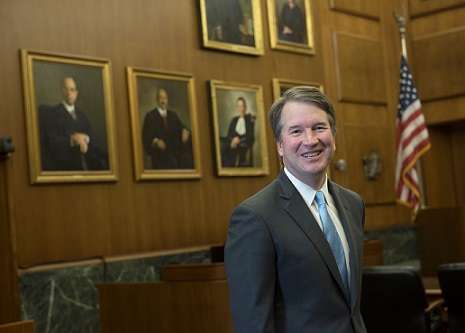The Volokh Conspiracy
Mostly law professors | Sometimes contrarian | Often libertarian | Always independent
Politico Symposium on How to Handle the Kavanaugh Sexual Assault Accusation
It includes contributions by a variety of legal scholars and commentators, including myself.

Politico has posted a symposium on how the Senate should handle the sexual assault accusation against Supreme Court nominee Judge Brett Kavanaugh. The symposium includes pieces by various prominent legal scholars and commentators, including Laurence H. Tribe, Sanford V. Levinson, Abbe Gluck, Deborah Rhode, Mari Matsuda, Catharine MacKinnon and Michele Landis Dauber, Richard Epstein, and Ilya Shapiro, among others. Here is an excerpt from my contribution:
The woman who has accused Supreme Court nominee Judge Brett Kavanaugh of sexual assault has now come forward. What should the Senate do? The Judiciary Committee should investigate the matter, and potentially hold additional hearings, and if necessary delay voting on the nomination, as recently suggested by GOP Senator Jeff Flake….
What should the standard of proof be? A Supreme Court confirmation hearing is very different from a criminal trial, where guilt must be proven beyond a reasonable doubt. Denying a person a lifetime position of vast power on the nation's highest court is not the same thing as taking away his or her liberty. It is reasonable to set a lower threshold for the former than the latter.
At the same time, it would be a mistake to put nominees in the position of having to definitively prove that accusations leveled against them are false. If that becomes the norm, virtually any nomination could be derailed by unsubstantiated accusations concerning alleged wrongdoing that occurred decades ago. I would thus tentatively suggest that the right standard is that of preponderance of evidence. If the evidence indicates that it is more likely than not that a Supreme Court nominee is guilty of serious wrongdoing, that should be sufficient to reject the nomination….
The situation may change radically if other women come forward with plausible accusations of sexual assault or harassment. Regardless, fair-minded observers should keep an open mind and should encourage the Senate to conduct as unbiased an investigation as possible. Sadly, that may be too much to expect in this era of poisonous partisan bias.
I also address the question of whether the accusation should be disqualifying if evidence indicates that it is likely to be true:
There is some merit to the idea that we should discount accusations about long-ago events that occurred when the perpetrator was a minor. But whether such issues can be ignored completely depends on the seriousness of the charge and the importance of the position for which the person is being considered. Sexual assault is a serious crime and a seat on the Supreme Court is a position of vast power.
In addition to this symposium, I highly recommend this insightful and balanced article on the issue, by Reason's Robby Soave.
UPDATE: The Politico symposium has added several additional contributors since I initially put up this post. I have edited the post accordingly.


Show Comments (507)